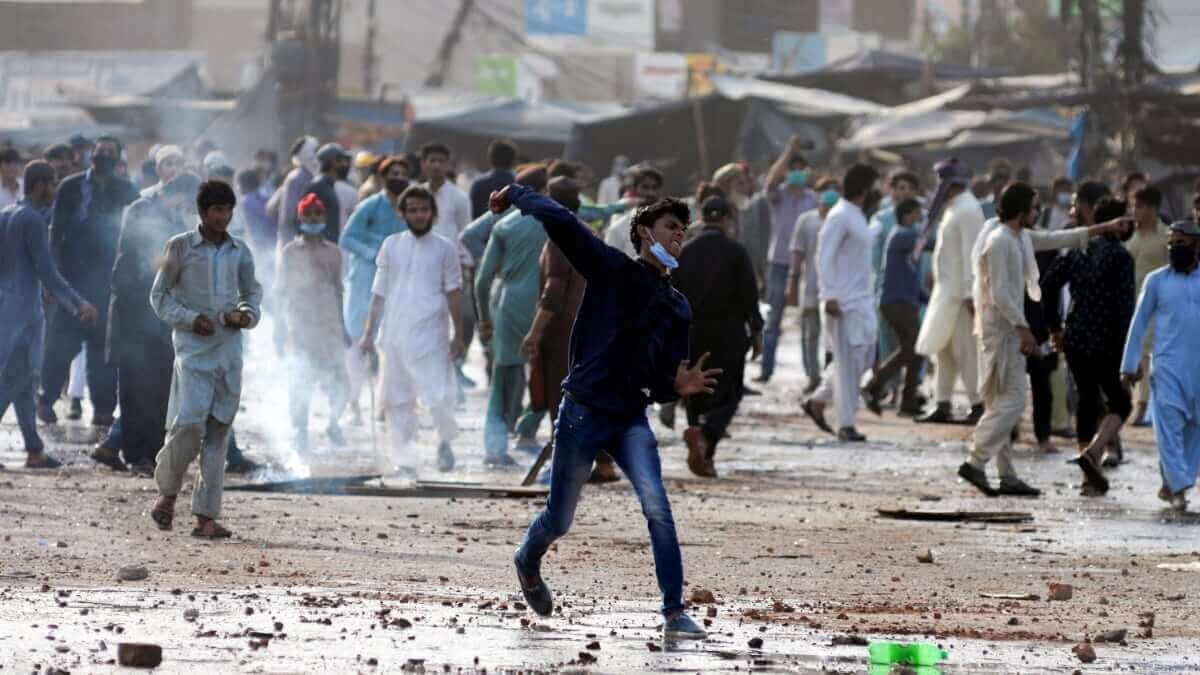The Pakistani government released 350 members of the Tehreek-e-Labbaik Pakistan (TLP), after the banned far-right Islamist held a fourth day of protests that have caused blockages on several critical highways near Lahore.
Speaking of the release, Interior Minister Sheikh Rasheed Ahmed said, “We have released 350 TLP workers up to now and we are still waiting to open both sides road of Muridke as per the decision with TLP.” This shortly followed his statement on Sunday, wherein he said that the government was ready to drop charges against leaders and activists of the group, along with reconsidering the names that feature on the list of citizens being monitored under the anti-terrorism laws.
The protests began on Friday, with around 8,000 activists blocking roads and firing projectiles. The key demand was the release of the group’s leader, Saad Rizvi. In order to disperse the protests, security forces have used tear gas shells and set up roadblocks and trenches to control the protesters’ movements; 500 paramilitary troops were also deployed. As a result of the clashes between the activists and the security forces, at least three policemen have died. According to TLP Central Information Secretary Pir Ejaz Ashrafi, ten members of the group were also killed in the clashes.
The protests have continued as the group’s top leadership negotiates with the Pakistani government, with the final round of discussions taking place on Monday. Hundreds of TLP members continue to protest at the highway near Muridka, 20 kilometres north of Lahore. As a result of the ongoing talks, protesters have agreed to wait at Muridke on the assurance that the TLP chief and other members will be released.
The most recent TLP protest was in April, when several cities across Pakistan, including Islamabad and Karachi, saw widespread protests by the TLP s that demanded the release of their leader, Saad Rizvi.
Rizvi was pre-emptively detained by the Pakistani authorities in April to “maintain law and order” after he presented the Pakistan government with an ultimatum to expel the French ambassador to the country. Right after his arrest, the group was declared a “proscribed organisation” under the country’s anti-terror laws. However, despite the protests, he has been in custody since April.
The TLP has gained popularity for its vociferous opposition to blasphemy and endorsing the boycott of French products in October 2020. During this period, the TLP organised a number of demonstrations that not only brought several cities to a standstill but also endangered authorities’ efforts to contain the COVID-19 pandemic. These protests were led by Saad Rizvi’s father, Khadim Hussain Rizvi, who died unexpectedly after the demonstrations.
Several commentators have criticised the Pakistani government for surrendering to the group. Dawn journalist and editor Hasan Zaidi said, “Bizarre that the government is negotiating and accepting the demands of “India-sponsored and India-directed organisations.” Or was that all the usual bullcrap that government ministers put out?”
These sentiments revive the scepticism that the decision to ban the TLP was merely to pacify the Financial Action Task Force (FATF). Pakistan has been on the FATF’s grey list since 2018 and outlined an action plan the same year to combat terrorism financing and money laundering. However, the FATF has said Pakistan has not addressed all items in the plan nor has it completely implemented the guidelines set by the watchdog. Consequently, the FATF retained Pakistan in its grey list following its meeting last week. Hence, the Pakistani government’s decision to negotiate with the TLP and release its leaders and activists could further hamper its campaign to be removed from the grey list.

